Since his escape to Germany, Ali Adubisi is committed to human rights in Saudi Arabia. Now he’s released his organization’s Report on the death penalty in the Kingdom. A Portrait.

Facilitates: Ali Adubisi (Mi.) with two friends after his release from prison in 2011
Israa Al-Ghomgham must always fear the death penalty. The Saudi women’s rights activist was arrested in December 2015. Then you spent without judgment 32 months in prison. The access to a lawyer was refused. Accused was participating in the unrest of the majority Shiite-populated province of Qatif in the Eastern province of Saudi Arabia. According to the indictment, Al-Ghomgham turned all the protesters. In addition, you must comply with protest songs, filmed and the Videos to the Internet. For these and other actions of the Saudi national, pleaded lawyer to process beginning in August 2018 for the death penalty. To-appeared the next trial date was three months later, Al – Ghomgham a fact that allows their supporters to their physical and mental health fear.
The case of the Saudi human rights activist in a documentary on the death penalty in Saudi Arabia, the Berlin-based human rights organization “European Saudi organization for Human Rights” (ESOHR) this week has published.
Committed to women’s rights
Israa Al-Ghomgham was not the first woman to see himself face to face with a death sentence, says Ali Adubisi, the founder and Director of ESOHR. Also death sentences against women had been already enforced. So was executed in October 2018, the 1984-born Indonesian Tuti Tursilawati. The young woman, the Arabia worked as a domestic help in Saudi, had been in need of a report by the human rights organization “migrant-rights.org” that since the year 2009, your employer repeatedly sexually abused. In the case of an Assault in March 2010, she stabbed him. The rapist died. The young woman was sentenced to death.

Site of horror: the execution square in Riyadh
Harsh sentences against women, would like aware, says Ali Adubisi in an interview with DW. Especially women were activists in the crosshairs of the judiciary: “women win in Saudi Arabia more and more Power. For the taste of conservative hard-liners is too much. More Freedom demands of the women do not want to allow. That’s why they give the women legal Because of a sign.”
Escape from Saudi Arabia
Ali Adubisi, who comes from the Shiite-dominated district of Al-Qatif in the East of the country, even gloomy experiences with the justice system in the Saudi Kingdom. In the spring of 2011, he was arrested for the first Time. In the case of a traffic control policeman came in his car on politically and culturally unpopular brochures, in particular, texts on human rights. As these, however, were not criminally relevant, he was released after three days detention.

In security: Ali Adubisi in Germany
In September 2011, he was arrested again – and again, because they found in him unpopular literature. This Time the imprisonment lasted for four months. In this time, so he represents it in his CV, he was abused, insulted and abused. You beat him with the hands, kicked him, leaving him for hours with his eyes blindfolded and hands and put him in a cell with severe temperature fluctuations. Overall, it was well kept 260 days without stating the reasons and legal justification, in confinement, including seven weeks in solitary confinement. As the authorities began in March 2013, to care for him, sat Adubisi with his family abroad. On a few detours he came to Germany.
“I’m glad to be here”
After his escape, he came to Germany, where he is working since then for the victims of political persecution in Saudi Arabia. To this end he founded the “European Saudi organization for Human Rights” (ESOHR), whose Director he is now. “I’m glad to be here,” says Adubisi. “Because here I can work freely and in safety.”
Regularly studies people published his organization since then, the legal situation in Saudi Arabia – this week about the Report on the death penalty in the Kingdom. In his work he relies on a network of informants in his old home: “there are a lot of people who collect information and pass it on.”

Justice on trial: protests against the execution of the Shia cleric Nimr al-Nimr, January 2016
The now released Report on the death penalty also relies on official sources in Saudi Arabia. There, the authorities met the Public on a regular basis over a span of a death. “These Announcements also serve to intimidate the population,” says Adubisi. For the year 2017 ESOHR documented sightings 146 executions. The number is consistent with the Findings of the human rights organization Amnesty International. In the year 2018 ESOHR, 149 people were executed. Adubisi speaks also of a dark figure in the low single-digit range. While the majority of people were executed for violations of the criminal law. Among the Victims of political or religiously motivated activists, such as the non-violent active Shiite preacher Nimr al-Nimr, who was executed in 2016, hung.
In Germany, he will have no fear, says Adubisi. Concern of the murder caused him, however, the Saudi journalist Jamal Khashoggi the Saudi Consulate in Istanbul in October last year. This gave rise to many dissident unrest, not only in Turkey. The more determined he was going to fight for the human rights in Saudi Arabia. “I’m many of my fellow citizens are guilty,” says Adubisi.
Watch the Video 03:28 live right Now 03:28 Min. 
Saudi Arabia in transition
Send Facebook Twitter google+ Tumblr VZ Mr. Wong Xing Newsvine Digg
Permalink https://p.dw.com/p/2vGds

